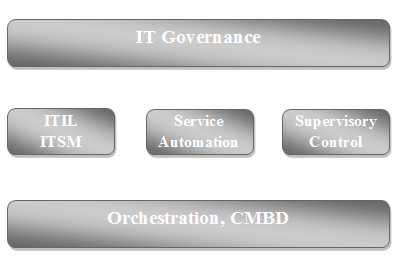Service Automation

Service automation
BSM – an approach to manage business-aligned IT services
Service automation is at the heart of the Business Service Management concept. It answers needs related to operational excellence for business-aligned IT services in a service lifecycle approach. From service inception, forward planning, inclusion in the budget, request deployment to production and supervisory control, compliance with Service Level Agreement (SLA) is guaranteed.


Service Automation
Service deployment automation in Datacenters
Service deployment automation is the solution for operational efficiency and effectiveness needs for any physical or virtual infrastructures, Cloud or Datacenter-oriented:
- Effectiveness to reach results domain or multi-domain combination (server, applications, middlewares, databases, network equipment) by unified management of technical environments that can be highly heterogeneous (OS, hypervisors, applications..) automated mechanisms for deployments and configurations of systems, ability to manage rollbacks without manual intervention and the application of rules of compliance for an entire domain.
- Efficiency to decrease deployment time and improve service quality thanks to automation and standardisation of many deployment processes (patches, platforms, application release, safety rules…). They reduce faults and implementation time and limit service interruption risks when changes occur by eliminating non-audit manual processes, by managing reusable deployment package templates and by spotting configuration gap through reporting.
Automation fits into heterogeneous technical environments by giving transparent access to the servers, systems, network equipment and applications.
Automation Key Performance Indicators
| Scope of Performance | Results |
| Service improvement for users |
|
| Optimisation of operational processes |
|
| Flexibility and Operational Adaptability |
|
| Financial |
|
Service orchestration and integration
From service design to the establishment of a pattern (business rules, SLA, service catalogue and associated deployment plan), their production deployment and their operational monitoring, both orchestration and service integration allow a service lifecycle management.
Thanks to its workflow engine, the orchestration automatically configures and furnishes the environments related to services throughout automation modules (servers, applications, middlewares, databases, network equipment).
Orchestration and automation are the fundamental basis for any service deployment in Cloud mode. However, they are not enough or an operational complexity might occur and that the Production department needs to take care of.
Service Management in the Cloud
Business service offers are shaped with options, SLA and a cost for user portal. A user can expect the flexibility required for this kind of approach.
Either simple or complex, these offers are shaped in a catalogue made for that specific purpose. It can be accessed from an administrator user. Policies and an intelligent process must launch the service deployment mechanism via automation tools by identifying the most adapted available resources and by taking into consideration the SLA and the estimated use.
A private Cloud is well-defined if the following factors are taken into account:
- The use of a company’s external resources should not be entirely abandoned as the concept of hybrid Cloud remains the most efficient
- The company’s processes should apply to the Cloud. Some processes need to be planned in advance, such as change management or configuration management that need to be adapted
- Capacity management is an important factor to ensure that resources can be aligned with businesses
contact us
by email :
By Phone :
Head Office
by mail
nmeasson@sapiensgroup.fr
+44 (0)207 156 7878
+33 (0)1 75 84 84 93
SAPIENS SOLUTIONS LIMITED
Victor House 81 Oxford Street
W1D 2EU London
United Kingdom
SAPIENS GROUP PARIS - Head Office
13, rue Salomon de Rothschild
92150 SURESNES
France
SAPIENS GROUP LYON
21 rue François Garcin
69003 LYON
France
SAPIENS GROUP NANTES
2 rue de Crucy L'Acropole
BP 60515
44005 NANTES cedex 1
France
SAPIENS GROUP TOULOUSE
478 rue de la Découverte
CS 67624 - Mini Parc 3
31676 LABEGE Cedex
France


 Sapiens Group
Sapiens Group Sapiens NTIC
Sapiens NTIC Sapiens R&D
Sapiens R&D Tenesea
Tenesea